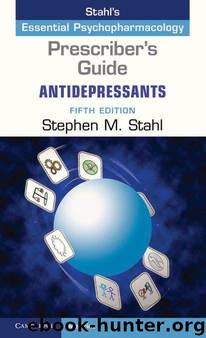Prescriber's Guide: Antidepressants: Stahl's Essential Psychopharmacology by Stephen M. Stahl

Author:Stephen M. Stahl
Language: eng
Format: mobi
Publisher: Cambridge University Press
Published: 2014-09-24T21:00:00+00:00
Lofepramine
Lofepramine: THERAPEUTICS
Brands
• Deprimyl
• Gamanil
see index for additional brand names
Generic?
Yes
Class
• Tricyclic antidepressant (TCA)
• Predominantly a norepinephrine/noradrenaline reuptake inhibitor
Commonly Prescribed for
(bold for FDA approved)
• Major depressive disorder
• Anxiety
• Insomnia
• Neuropathic pain/chronic pain
• Treatment-resistant depression
How the Drug Works
• Boosts neurotransmitter norepinephrine/noradrenaline
• Blocks norepinephrine reuptake pump (norepinephrine transporter), presumably increasing noradrenergic neurotransmission
• Since dopamine is inactivated by norepinephrine reuptake in frontal cortex, which largely lacks dopamine transporters, lofepramine can increase dopamine neurotransmission in this part of the brain
• A more potent inhibitor of norepinephrine reuptake pump than serotonin reuptake pump (serotonin transporter)
• At high doses may also boost neurotransmitter serotonin and presumably increase serotonergic neurotransmission
How Long Until It Works
• May have immediate effects in treating insomnia or anxiety
• Onset of therapeutic actions usually not immediate, but often delayed 2–4 weeks
• If it is not working within 6–8 weeks for depression, it may require a dosage increase or it may not work at all
• May continue to work for many years to prevent relapse of symptoms
If It Works
• The goal of treatment of depression is complete remission of current symptoms as well as prevention of future relapses
• The goal of treatment of chronic neuropathic pain is to reduce symptoms as much as possible, especially in combination with other treatments
• Treatment of depression most often reduces or even eliminates symptoms, but not a cure since symptoms can recur after medicine stopped
• Treatment of chronic neuropathic pain may reduce symptoms, but rarely eliminates them completely, and is not a cure since symptoms can recur after medicine is stopped
• Continue treatment of depression until all symptoms are gone (remission)
• Once symptoms of depression are gone, continue treating for 1 year for the first episode of depression
• For second and subsequent episodes of depression, treatment may need to be indefinite
• Use in anxiety disorders and chronic pain may also need to be indefinite, but long-term treatment is not well studied in these conditions
If It Doesn’t Work
• Many depressed patients have only a partial response where some symptoms are improved but others persist (especially insomnia, fatigue, and problems concentrating)
• Other depressed patients may be nonresponders, sometimes called treatment-resistant or treatment-refractory
• Consider increasing dose, switching to another agent or adding an appropriate augmenting agent
• Consider psychotherapy
• Consider evaluation for another diagnosis or for a comorbid condition (e.g., medical illness, substance abuse, etc.)
• Some patients may experience apparent lack of consistent efficacy due to activation of latent or underlying bipolar disorder, and require antidepressant discontinuation and a switch to a mood stabilizer
Download
This site does not store any files on its server. We only index and link to content provided by other sites. Please contact the content providers to delete copyright contents if any and email us, we'll remove relevant links or contents immediately.
| Administration & Medicine Economics | Allied Health Professions |
| Basic Sciences | Dentistry |
| History | Medical Informatics |
| Medicine | Nursing |
| Pharmacology | Psychology |
| Research | Veterinary Medicine |
The Art of Thinking Clearly by Rolf Dobelli(10410)
The 5 Love Languages: The Secret to Love That Lasts by Gary Chapman(9777)
Mindhunter: Inside the FBI's Elite Serial Crime Unit by John E. Douglas & Mark Olshaker(9312)
Becoming Supernatural by Dr. Joe Dispenza(8195)
Nudge - Improving Decisions about Health, Wealth, and Happiness by Thaler Sunstein(7689)
The Road Less Traveled by M. Scott Peck(7590)
Mastermind: How to Think Like Sherlock Holmes by Maria Konnikova(7313)
Enlightenment Now: The Case for Reason, Science, Humanism, and Progress by Steven Pinker(7303)
Win Bigly by Scott Adams(7183)
The Way of Zen by Alan W. Watts(6591)
Factfulness: Ten Reasons We're Wrong About the World – and Why Things Are Better Than You Think by Hans Rosling(4729)
The State of Affairs by Esther Perel(4709)
Gerald's Game by Stephen King(4636)
Man's Search for Meaning by Viktor Frankl(4569)
The Confidence Code by Katty Kay(4245)
Thinking in Bets by Annie Duke(4214)
The Healing Self by Deepak Chopra(3568)
Hidden Persuasion: 33 psychological influence techniques in advertising by Marc Andrews & Matthijs van Leeuwen & Rick van Baaren(3549)
The Worm at the Core by Sheldon Solomon(3483)
